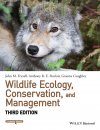Textbook
Out of Print
By: Anthony RE Sinclair(Author), John M Fryxell(Author), Graeme Caughley(Author)
528 pages, 158 illustrations
![Wildlife Ecology, Conservation and Management Wildlife Ecology, Conservation and Management]()
Click to have a closer look
About this book
Contents
Biography
Related titles
Recommended titles
About this book
This is much expanded and extensively revised second edition of one of the standard textbooks on wildlife management. It provides a thorough introduction to general ecological principles and examines how they can be applied to wildlife management and conservation.
There are new chapters on understanding ecosystems and the use of computer models in wildlife management, and a comprehensive, up-to-date overview of ecology including the latest theories on population dynamics and conservation. The book reviews practical applications and techniques and assesses how these can be used to formulate realistic objectives within an ecological framework. Examples of real-life management situations from around the world are given, to provide a broad perspective on the international problems of conservation. Finally, there are worked examples on CD-ROM enable students to practice calculations explained in the text.
Contents
Preface
1 Introduction
2 Biomes
3 Animals as individuals
4 Population growth
5 Dispersal, dispersion, and distribution
6 Food and feeding
7 The ecology of behavior
8 Population regulation, fluctuation and competition within species
9 Competition and facilitation between species
10 Predation
11 Consumer-resource dynamics
12 Parasites and pathogens
13 Communities and ecosystems
14 Counting animals
15 Experimental management
16 Model evaluation and adaptive management
17 Conservation in theory
18 Conservation in practice
19 Wildlife harvesting
20 Wildlife control References Appendices
Index
Customer Reviews
Biography
Tony Sinclair is former Director of the Centre for Biodiversity Research at the University of British Columbia, Canada. Working in the Serengeti National Park, Tanzania, Africa, on ecology and conservation projects for over 40 years, he also carries out research in Canadian subartic ecosystems, as well as being involved in conservation issues in Australia and New Zealand. Previous publications include: Wildlife Ecology (1994), African Buffalo (1977), Serengeti (1979), Serengeti II (1995), Serengeti III (2009), and Conserving National Diversity (2000).
John Fryxell is currently at the Department of Integrative Biology, at the University of Guelph, Canada, having previously worked at the University of British Columbia and as Wildlife Consultant for the Provincial Government of Newfoundland and Labrador. His current research focuses on the role of behavior in population and community dynamics of large mammals. He is the author of Individual behaviour and Community Dynamics (1998) and the forthcoming title Serengeti III with Tony Sinclair.
Textbook
Out of Print
By: Anthony RE Sinclair(Author), John M Fryxell(Author), Graeme Caughley(Author)
528 pages, 158 illustrations
"This is a most excellent book [...] The authors manage to pull the best out of the lessons that wildlife ecology, conservation biology, and habitat management should have taught us over the past 30 years, and present the results in clear, insightful prose."
- John Anderson, College of the Atlantic
"This book has one very interesting feature: it comes with a CD-ROM complete with exercises and an evaluation copy of a mathematical calculating/drawing program called Mathcad [...] Overall, a comprehensive text, well designed, aimed at the more experienced student/conservationist."
- Teaching Ecology Group Newsletter
"The scope of the book is broad and the subject matter logically presented and well-explained."
- Bulletin of the British Ecological Society




































